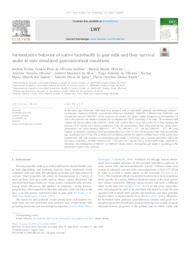Fermentative behavior of native lactobacilli in goat milk and their survival under in vitro simulated gastrointestinal conditions.
Fermentative behavior of native lactobacilli in goat milk and their survival under in vitro simulated gastrointestinal conditions.
Author(s): GALDINO, I. K. C. P. de O.; OLIVEIRA, M. M.; OLIVEIRA, A. T.; SILVA, G. M. da; OLIVEIRA, T. A. de; SANTOS, K. M. O. dos; EGITO, A. S. do; BURITI, F. C. A.
Summary: In this study, goat fermented milk trials were prepared with six potentially probiotic autochthonous cultures Lactobacillus rhamnosus EM1107, Lactobacillus plantarum (CNPC001, CNPC002, CNPC003 and CNPC004) and Lactobacillus mucosae CNPC007in the presence and absence of a starter culture (Streptococcus thermophilus, ST) and in the presence and absence of inulin (IN) or oligofructose (FOS), consisting of 36 trials. The fermented milk without the starter culture only achieved a lactic acid content above 0.6 g/100 g after 24 h, thus requiring the presence of ST culture for a faster acidification. After the fermentation, three trials with the best fermentative performance and visual firmness (EM1107 + ST + IN, CNPC003 + ST + IN and CNPC007 + ST + IN) were exposed to simulated conditions of the gastrointestinal tract (GIT) in vitro. All fermented milk, with Lactobacillus spp. population above 6 log CFU/g before GIT simulation, showed the highest viability losses in the gastric step. In fermented milk with Streptococcus thermophilus plus inulin, L. rhamnosus and L. mucosae performed well in the GIT assay, achieving a viability between 6.50 - 7.24 and 6.50-7.60 log CFU/g in the enteric stage, respectively. Therefore, the combination of EM1107 or CNPC007 strains with S. thermophilus and inulin is promising in the production of goat dairy products.
Publication year: 2021
Types of publication: Journal article
Unit: Embrapa Food Technology
Keywords: Alimentos funcionais, Coculture, Fermented goat milk, Food technology, Functional properties, In vitro gastrointestinal resistance, Inulin, Lactic acid bacteria, Lactobacillus casei, Lactobacillus plantarum, Lactobacillus rhamnosus, Lactobacillus spp, Potencial probiótico, Prebiotic, Prebiotics, Probiotic potential, Probiótico, Produtos probióticos, Strains, Viability
Observation
Some of Embrapa's publications are published as ePub files. To read them, use or download one of the following free software options to your computer or mobile device. Android: Google Play Books; IOS: iBooks; Windows and Linux: Calibre.
Access other publications
Access the Agricultural Research Database (BDPA) to consult Embrapa's full library collection and records.
Visit Embrapa Bookstore to purchase books and other publications sold by Embrapa.

